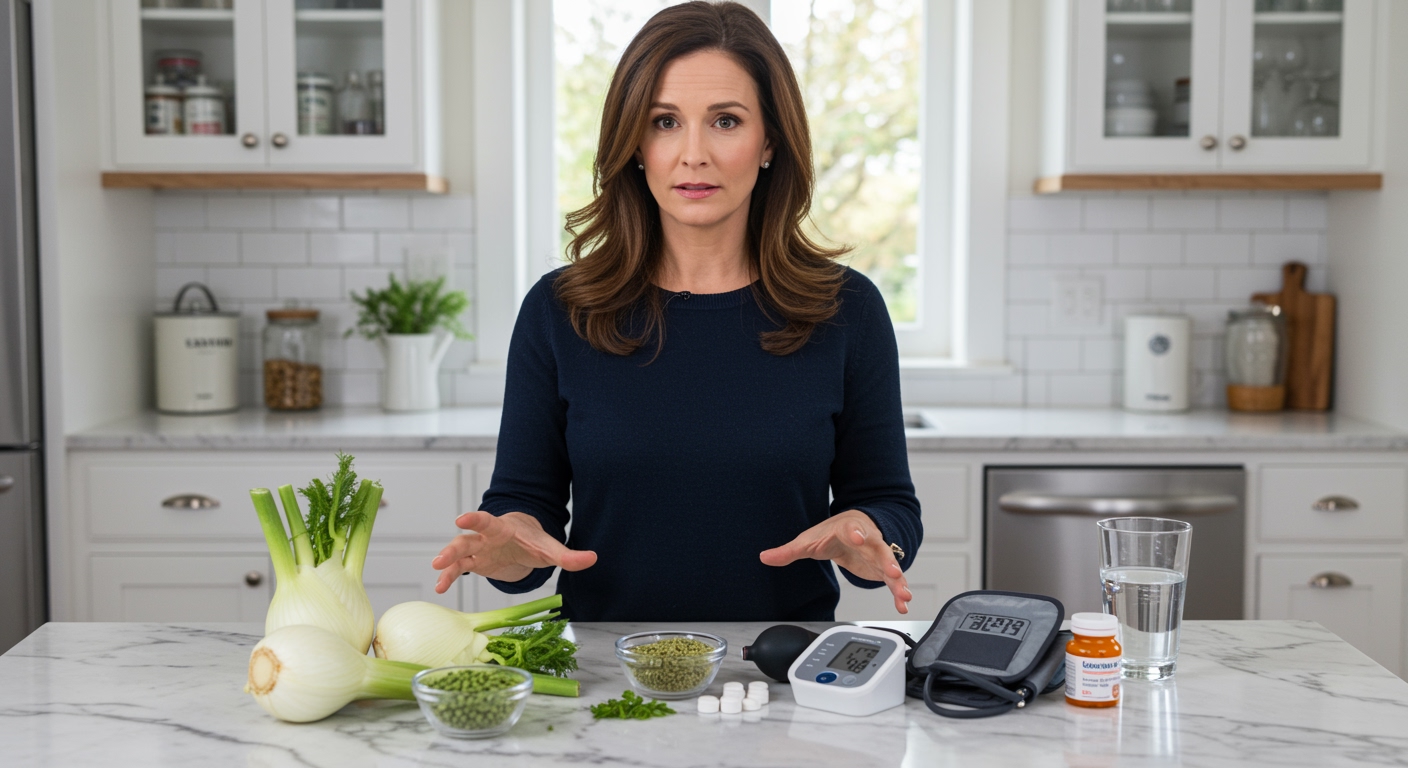✪ Key Takeaway: Fennel can lower blood pressure, but this effect may be dangerous for people already taking blood pressure medications.
Introduction
Your grandmother swears by fennel tea for digestion, but now you are wondering if this innocent-looking spice could mess with your blood pressure.
You might be asking this question because you have heard conflicting information about fennel and blood pressure, or perhaps your doctor mentioned being careful with herbs while taking blood pressure medication.
Hi, I am Abdur, your nutrition coach and today I am going to explain exactly how fennel affects your blood pressure and when it becomes dangerous.
How Does Fennel Actually Lower Blood Pressure?
Fennel contains potassium, a mineral that helps your kidneys remove excess sodium from your body through urine.
When sodium levels drop, your blood vessels relax and your blood pressure naturally decreases.
The fennel plant also contains compounds called flavonoids that act like natural calcium channel blockers.
These compounds prevent calcium from entering the smooth muscle cells in your blood vessel walls.
Without calcium, these muscles cannot contract as forcefully, which means your blood vessels stay more relaxed and your blood pressure stays lower.
Research shows that people who consume fennel regularly experience an average blood pressure reduction of 5-10 mmHg in both systolic and diastolic readings.
✪ Fact: One cup of sliced fennel bulb contains 360mg of potassium, about 10% of your daily needs.
When Does Fennel Become Dangerous For Blood Pressure?
The danger comes when you combine fennel with blood pressure medications without medical supervision.
If you are taking ACE inhibitors, calcium channel blockers, or diuretics, adding fennel to your diet can create a double effect that drops your blood pressure too low.
When your blood pressure drops below 90/60 mmHg, you enter a condition called hypotension.
This means your organs are not getting enough oxygen-rich blood to function properly.
You might experience dizziness, fainting, blurred vision, nausea, or extreme fatigue.
In severe cases, dangerously low blood pressure can lead to shock, where your vital organs start shutting down.
✪ Pro Tip: Always check your blood pressure for two weeks after adding fennel to your routine if you take any medications.
Who Should Avoid Fennel Completely?
People with naturally low blood pressure should avoid consuming large amounts of fennel regularly.
If your normal blood pressure readings are already below 100/70 mmHg, fennel could push you into dangerous hypotension territory.
Pregnant women should also be cautious because fennel can affect hormone levels and potentially impact blood pressure regulation during pregnancy.
People taking multiple medications for heart conditions, kidney problems, or diabetes need to be especially careful.
These medications often work together to manage blood pressure, and adding fennel can disrupt this delicate balance.
If you have a history of fainting spells, heart rhythm problems, or have been told you have orthostatic hypotension, fennel consumption should be discussed with your doctor first.
✪ Note: Orthostatic hypotension means your blood pressure drops when you stand up quickly, causing dizziness.
How Much Fennel Is Safe To Consume?
For most healthy adults, consuming one cup of fresh fennel or one teaspoon of fennel seeds daily is generally safe.
This amount provides health benefits without creating dramatic blood pressure changes.
However, if you are taking blood pressure medications, start with half these amounts and monitor your blood pressure daily for two weeks.
Keep a blood pressure log and note any symptoms like dizziness, fatigue, or lightheadedness.
Fennel tea should be limited to one cup per day maximum, and avoid drinking it within two hours of taking your blood pressure medication.
Remember that fennel supplements contain concentrated amounts and can have much stronger effects than whole fennel, so these require even more caution.
✪ Pro Tip: Space fennel consumption at least 4 hours away from blood pressure medication timing for safety.
The Bottom Line
Fennel can indeed lower blood pressure, and while this is beneficial for many people, it can become dangerous when combined with medications or consumed by people with already low blood pressure.
Smart nutrition means understanding that even natural foods can interact with your medications and health conditions.
I would love to hear about your experiences with fennel and blood pressure in the comments below, and please share any questions you might have about safely incorporating herbs into your diet.
References
At NutritionCrown, we use quality and credible sources to ensure our content is accurate and trustworthy. Below are the sources referenced in creating this article:





